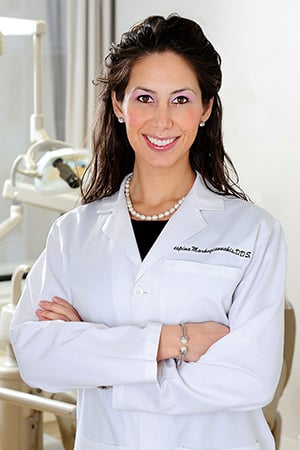Dr. Despina Markogiannakis answers common questions on Restorative Dentistry. Dr. Markogiannakis can be reached at Smiles of Chevy Chase, 5454 Wisconsin Ave, Suite 835, Chevy Chase, MD 20815. (301) 652-0656.
My gums bleed when I floss – should I be concerned?
The health of your mouth, especially your gums, can be a window to the state of your overall health. There are a number of recent studies to show that inflammation anywhere in the body is both the cause and effect of an unhealthy condition. The bleeding of your gums can be as simple as your needing to have your teeth cleaned more frequently or that you have some form of periodontal (gum) disease. It can also be a sign of something more ominous – especially if this is a sudden change from your “normal”. Your dentist and hygienist can help you both determine the cause and the treatment of dental component of the problem and direct you to the appropriate medical professional if there is any concern that there needs to be further investigation.
Sometimes, when I chew crunchy cereal, I’ll feel a sharp pain on one of my lower back teeth. Most of the time I don’t feel it at all. Should I be concerned?
I see a lot of people whose teeth are too white and look un-natural. Is this going to happen to me if I bleach my teeth?
No. The objective is to make your teeth appear “fresher” and lighter. Like lipstick, eye shadow, and makeup – there’s a shade that works best for you. Your dentist should be able to determine the appropriate target shade for you. There are many different “bleaching” (better known as whitening) products. Some are over the counter, and some are only for use by a dentist. Often, combining in-office whitening procedures with take-home custom trays will allow patients to achieve a more natural result.
I’m 55 years old and have had very little need for dental treatment. Because of this, I sometimes don’t go to the dentist for years at a time. Some of my friends have to see a dentist every 3 months, some are every 6 months. How often should I go?
Regardless of your perceived need for dental treatment, good dental care involves more than fillings and cleanings. It is VERY important that everyone be screened for oral cancers. Mouth cancers of all types can often be detected at an early stage. As with every form of cancer, early detection leads to early treatment which can correlate to a more favorable outcome. You may very well be one of the few people who rarely need cleanings because you don’t build up plaque and calculus. It is important to remember that both periodontal disease and decay is often painless in the early stages. Your dentist will develop a plan that is tailored to you and your needs.
I’m 29 years old and have always wanted better looking front teeth. Should I get veneers?
The short answer is “it depends”. There are many different ways to satisfy a patient’s “wants”. Along with your dentist, you must first determine what it is about your teeth that bother you. For example are they too long, too short, too wide, or too crooked. Is it the color that you don’t like, or do you show too much of your gums when you smile? Once a proper diagnosis is made, then an appropriate plan to address your concerns can be developed. Often a little reshaping of the teeth, bonding, whitening or minor orthodontic movement can solve the problem. It is important to keep in mind that veneers, thin porcelain coverings, are a restorative procedure where some of your natural tooth structure is removed. No dental restoration can be expected to last forever. At some point, veneers will chip, crack, discolor, and will have to be replaced. The younger the patient is, the more in their lifetime, replacement of the restorations should be expected.










